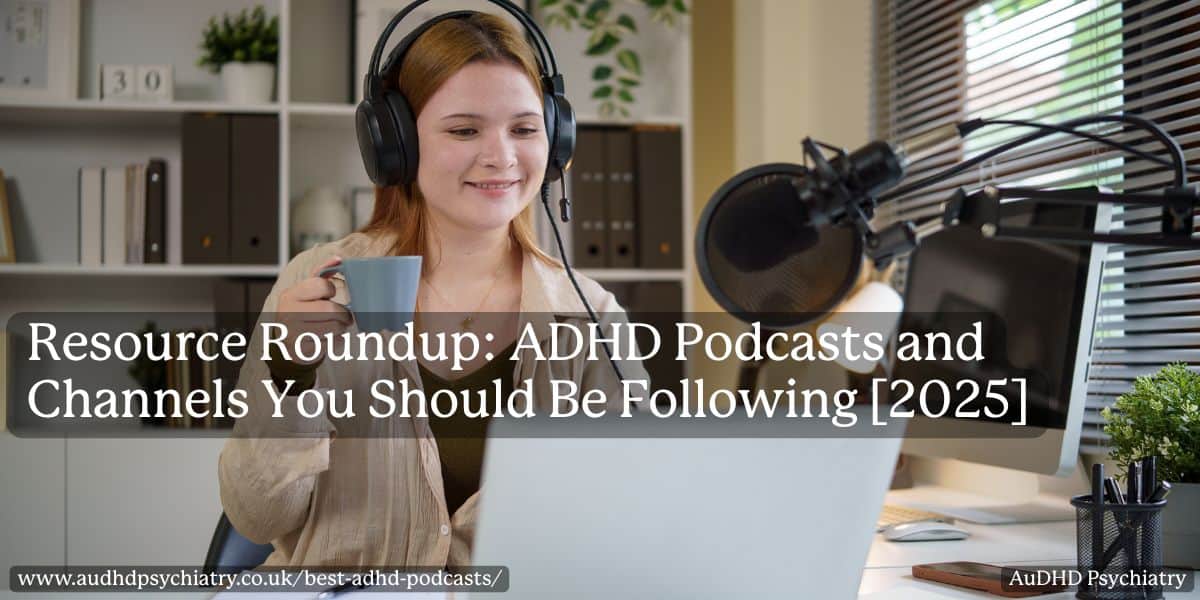
Finding reliable information on ADHD can feel overwhelming. Between personal blogs, academic research, and social media advice, it’s hard to know what’s trustworthy or even relevant to your situation. That’s where ADHD podcasts and YouTube channels come in. These platforms offer accessible, research-informed discussions that can help you better understand ADHD symptoms, executive functioning challenges, and the day-to-day realities of living with the condition.
The best ADHD podcasts and channels provide two things: clarity and connection. Whether you’re newly diagnosed, supporting a child, or exploring your own experiences as an adult, they bring together professional expertise and lived experience in a way that feels both informative and supportive.
In this roundup, we highlight the top ADHD podcasts and channels to follow in 2025, giving you credible, practical resources you can trust to guide your ADHD journey.
Why ADHD Podcasts and Channels Matter
ADHD can make it difficult to filter useful information from overwhelming noise. Podcasts and YouTube channels tailored to ADHD have become essential resources because they present ideas in an engaging and accessible way. They allow people to learn strategies, explore personal experiences, and gain professional insights without feeling buried in jargon.
Accessible and Practical
Unlike lengthy research papers or books, ADHD podcasts are designed for everyday listening. They fit into daily routines, whether commuting, exercising, or cooking, turning spare moments into opportunities for learning. This makes them particularly helpful for individuals who struggle with focus or motivation, as the format is easy to consume.
Professional Expertise and Lived Experience
Many ADHD podcasts and channels combine clinical perspectives with first-hand stories. You’ll hear advice from certified ADHD coaches, psychologists, and medical professionals alongside the voices of people navigating ADHD themselves. This balance ensures listeners receive research-informed strategies while also feeling validated by shared experiences.
Connection and Community
Perhaps most importantly, these platforms reduce isolation. Hearing others describe challenges with executive functioning or emotional regulation helps normalise common struggles. They also introduce audiences to wider support networks and professional pathways.
By blending education, accessibility, and a sense of community, ADHD podcasts and channels have become one of the most effective ways for people to deepen their understanding of the condition.
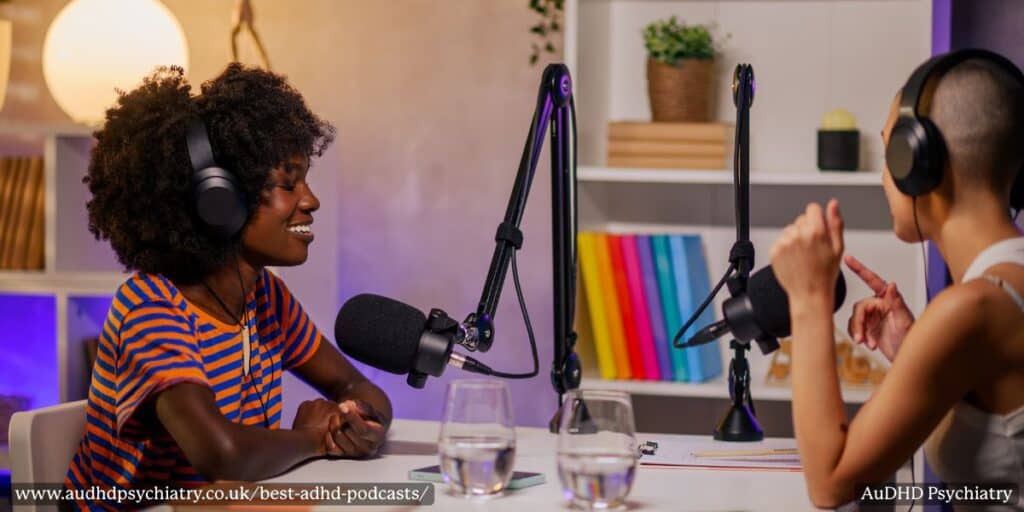
Top ADHD Podcasts
Podcasts remain one of the most accessible and engaging ways to learn about ADHD. They combine the expertise of clinicians and coaches with the authenticity of lived experience. Whether you’re an adult newly diagnosed, supporting a child, or exploring strategies for executive functioning, these podcasts offer perspectives that feel both informative and practical.
I Have ADHD Podcast
Hosted by Kristen Carder, a certified ADHD life coach, this podcast focuses on the daily challenges of living with ADHD. Carder combines coaching techniques with relatable stories to help listeners build practical strategies. Episodes cover emotional regulation, time management, and self-compassion, making it especially supportive for adults navigating their ADHD journey.
Faster Than Normal
Peter Shankman reframes ADHD as a potential advantage rather than purely a challenge. Through interviews with entrepreneurs, athletes, and professionals, he explores how ADHD traits can fuel creativity, energy, and productivity. This positive framing appeals to listeners who want to see ADHD not only as a disorder but also as a different way of thinking.
ADHD for Smart Ass Women
Tracy Otsuka, a certified ADHD coach, created this podcast to empower women with ADHD. Episodes focus on reframing negative self-perceptions and building confidence. Tracy blends personal insights with coaching expertise, offering strategies that resonate strongly with women who may have been diagnosed later in life.
ADHD reWired
Eric Tivers, a licensed clinical social worker and ADHD coach, hosts ADHD reWired. This long-running podcast is well known for its in-depth interviews with experts such as Ari Tuckman and its strong community element. Listeners gain access to both evidence-based strategies and shared stories that reduce the stigma around ADHD.
Hacking Your ADHD
William Curb hosts Hacking Your ADHD, a podcast dedicated to short, actionable tips. Episodes focus on building healthy habits, developing productivity systems, and managing executive functioning difficulties. Its concise format makes it especially useful for listeners who prefer information in small, manageable doses.
ADHD Essentials
Brendan Mahan draws on his background as a teacher and coach to explore the educational and family dimensions of ADHD. Episodes often focus on parenting, emotional regulation, and supporting children through diagnosis and treatment. This makes the podcast particularly valuable for parents and educators seeking practical guidance.
The ADHD Friendly Lifestyle
Moira Maybin, an ADHD advocate and coach, hosts this podcast focusing on sustainable strategies for living well with ADHD. She explores how lifestyle changes can support executive functions, reduce burnout, and improve overall wellbeing. The tone is supportive and compassionate, making it helpful for listeners who feel overwhelmed by constant productivity advice.
Adulting with ADHD
This podcast explores the intersection of ADHD and gender, with a focus on ADHD women and neurodivergent women. Topics include hormonal influences, emotional health, and challenges unique to women who are late diagnosed. The blend of advocacy and practical advice makes it an important resource for a demographic often underrepresented in ADHD discussions.
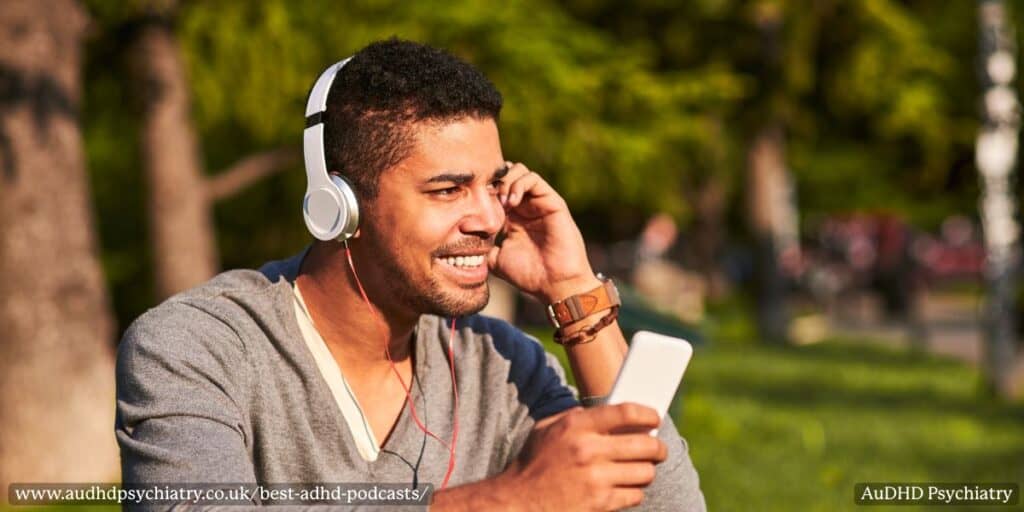
Translating ADHD
Coaches Asher Collins and Dusty Chipura host Translating ADHD, a podcast dedicated to breaking down the complexities of ADHD into clear, manageable steps. They focus on actionable coaching strategies, executive functioning skills, and the importance of understanding ADHD in context.
ADHD Support Talk
A long-running podcast hosted by Tara McGillicudy and Lynne Edris, ADHD Support Talk offers interviews with experts and practical discussions. Topics range from emotional regulation to treatment approaches. Its longevity makes it a reliable source for listeners looking for a wide variety of ADHD perspectives.
ADHD Experts Podcast
Produced by ADDitude Magazine, this podcast features leading voices in ADHD research and treatment, including Ari Tuckman and Penny Williams. The focus is on evidence-based strategies and expert interviews, making it particularly useful for those seeking professional insight into ADHD diagnosis and treatment.
The ADHD Adults Podcast
A UK-based show, The ADHD Adults Podcast is hosted by married couple James Brown and Sam Brown, and Professor and author Alex Conner who were themselves late-diagnosed. It blends humour with research-informed discussion, making it relatable for listeners who want both science and personality. This podcast has quickly become a favourite among UK adults with ADHD.
ADHD as Females Podcast
This podcast is hosted by Laura Mears-Reynolds and centres on the lived experience of ADHD. It tackles themes such as stigma, relationships, and the challenges of navigating the workplace. For listeners who want to hear authentic, unfiltered conversations about ADHD, it provides an invaluable perspective.
ADHD Aha!
ADHD Aha! shares the “lightbulb moments” people experience when they first realise they have ADHD. Through personal stories, listeners hear about the path to diagnosis, treatment, and self-acceptance. This podcast resonates with anyone who is still exploring whether their traits may be linked to ADHD.
ADHD Women’s Wellbeing Podcast
Hosted by Kate Moryoussef, a wellbeing coach, this podcast addresses the unique challenges faced by high-achieving women with ADHD. Episodes highlight self-care, emotional health, and practical adjustments that can make daily life more manageable. The focus on women makes it a useful complement to more general ADHD podcasts.
Taking Control: The ADHD Podcast
Pete Wright and Nikki Kinzer host Taking Control, a long-running show about organisation and productivity. While not exclusively ADHD-focused, many episodes address ADHD traits and executive functioning challenges directly. The practical tips and coaching advice make it particularly valuable for those who struggle with structure and planning.
Why These Podcasts Stand Out
Together, these podcasts cover the spectrum of ADHD experiences – from scientific expertise to personal storytelling. They provide strategies for symptom management, inspiration for reframing ADHD traits, and communities where listeners feel understood. For those navigating ADHD in adulthood, podcasts can also be a starting point for seeking professional assessment and treatment.
If you’re curious about your own experiences, feel free to hop on a quick call with us. We’ll happily answer your questions before you decide if you’d like to take an ADHD assessment.
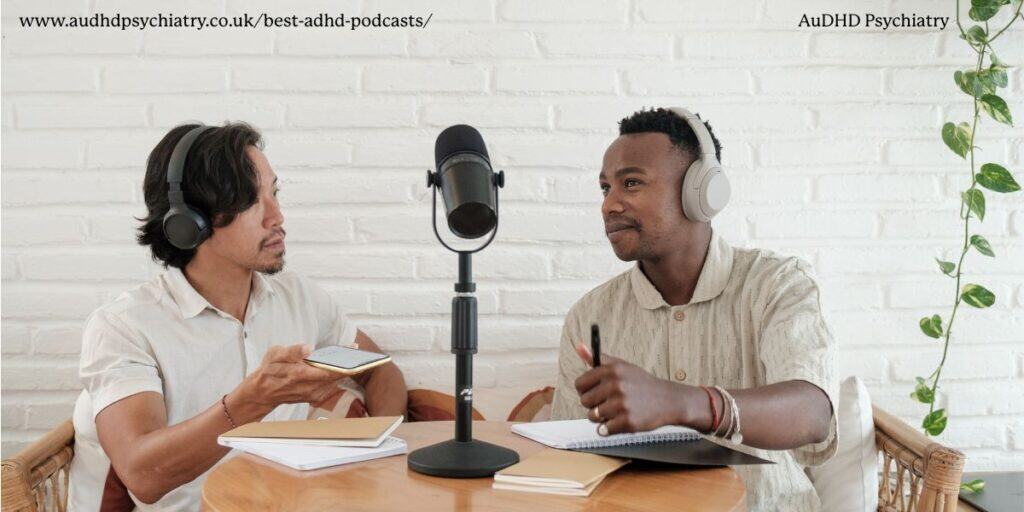
Top ADHD YouTube Channels
YouTube has become one of the most accessible ways to learn about ADHD. Channels run by clinicians, coaches, and people with lived experience offer a mix of strategies, personal stories, and expert insight. Whether you’re exploring executive functioning, emotional regulation, or practical life hacks, these creators provide information in a way that feels both engaging and trustworthy.
For additional ADHD resources, see our ADHD Resources & Tools and ADHDdegree Directories & Platforms.
How to ADHD
Jessica McCabe’s How to ADHD remains the most recognised ADHD channel on YouTube. She blends personal experiences with evidence-informed advice, presenting topics such as executive functioning, ADHD symptoms, and task management in short, accessible videos. The channel also highlights tools, apps, and strategies that can support daily life. McCabe’s approachable style makes complex information easier to understand, making this a valuable starting point for anyone new to ADHD.
Rick Has ADHD
Rick Green is known for combining education with humour to break down ADHD myths and stereotypes in his videos. The channel includes advice, tricks, and practical tips on managing ADHD in everyday life. While upload frequency has slowed in recent years, the existing content still resonates with audiences who value a lighter yet informative approach.
Dr LeGrand
This channel is hosted by Dr LeGrand, a medical doctor who shares insights on ADHD and related health topics. His videos focus on improving focus, managing ADHD symptoms, and building healthier daily habits. In addition to ADHD-specific strategies, Dr LeGrand covers broader aspects of mental and physical health, offering a more holistic perspective.
Dr Tracey Marks
A practising psychiatrist, Dr Tracey Marks covers ADHD alongside broader mental health conditions such as anxiety and sleep disorders. Her channel stands out for delivering concise, clinically grounded explanations of how ADHD affects the brain and behaviour. For viewers seeking evidence-based information on treatment options and ADHD challenges, Dr Marks’ videos provide a reliable source of professional expertise.
ADHD Mastery
ADHD Mastery shares content on motivation, ADHD traits, and executive functioning strategies. However, it is important to note that uploads stopped around two years ago. While the archived videos remain useful, audiences should keep in mind that the content may not reflect the latest ADHD research or trends. Checking the publication dates before applying advice is recommended.
TEDx Talks (ADHD-Focused)
Although not a dedicated ADHD channel, TEDx Talks features numerous ADHD-focused presentations. Speakers include clinicians, researchers, and neurodivergent individuals sharing insights into ADHD symptoms, emotional regulation, and personal experiences. The talks are well produced and widely accessible, making them an excellent supplement to more specialised channels.
Different Brains
Different Brains is a neurodiversity-focused channel covering ADHD, autism, and related conditions. It emphasises inclusion, accessibility, and the strengths of neurodivergent individuals. In this weekly interview show hosted by Dr Harold Reitman, viewers will find expert interviews, discussions on topics such as emotional dysregulation, and lived-experience stories, making it a well-rounded resource for those who want to understand ADHD in the broader context.
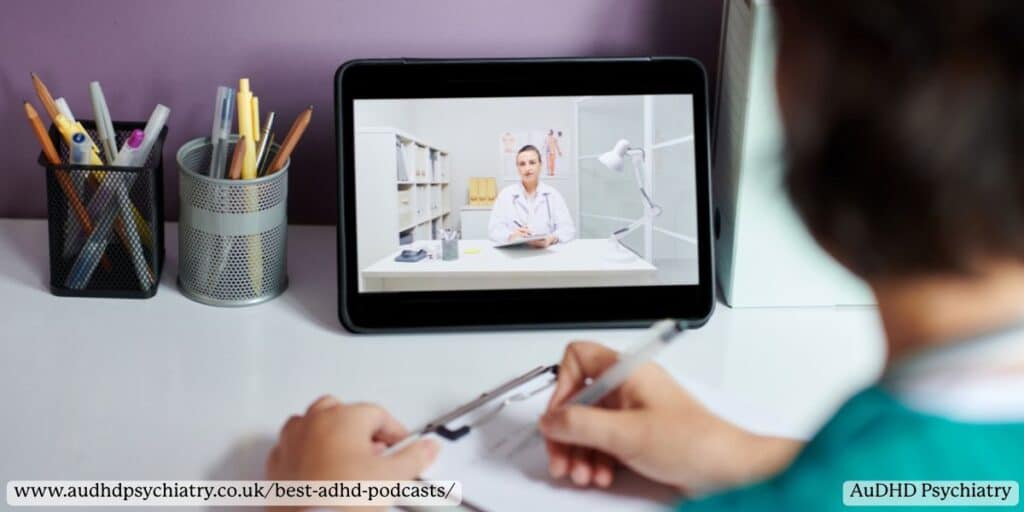
HealthyGamer GG
Run by psychiatrist Dr Alok Kanojia (Dr K), HealthyGamer GG is not exclusively focused on ADHD but covers it as part of broader discussions on mental health and gaming. His content explores ADHD symptoms, attention, and motivation, particularly in young adults. The mix of clinical expertise and relatable cultural context makes it an appealing resource for people managing ADHD in the digital age.
ADDitude Magazine
ADDitude Magazine has a strong YouTube presence alongside its articles and webinars. The channel features ADHD experts discussing topics such as executive functioning, ADHD diagnosis, and treatment approaches. While it is based in the US, the advice is broadly applicable and rooted in professional expertise. For UK viewers, it offers an additional perspective on managing ADHD challenges across the lifespan.
Understood
Understood provides resources for ADHD and learning differences, with a strong focus on children, young adults, and families. The channel shares strategies for ADHD symptom management, school accommodations, and building supportive environments. Its practical and inclusive content makes it a particularly useful resource for parents and carers.
Why These Channels Matter
These channels represent a balance of professional expertise, lived experience, and inclusive perspectives. Together, they cover the spectrum of ADHD support: from practical strategies for executive functioning to broader conversations about neurodiversity and emotional health. By exploring a range of voices, viewers can find advice that feels both relevant and credible.
How to Choose the Right ADHD Podcast or Channel
With so many options available, choosing the best ADHD podcast or YouTube channel can feel daunting. The right choice depends on your goals, whether that’s learning practical strategies, hearing lived experiences, or exploring expert advice. Taking time to match content to your needs makes the listening experience more useful and sustainable.
Match Content to Your ADHD Journey
No two ADHD journeys look the same. Some listeners may want professional guidance on ADHD symptoms and treatment, while others prefer hearing how everyday people manage challenges. A good starting point is to ask yourself: do you want research-backed strategies, motivational stories, or both? Selecting a channel that reflects your lifestyle ensures the advice feels relatable.
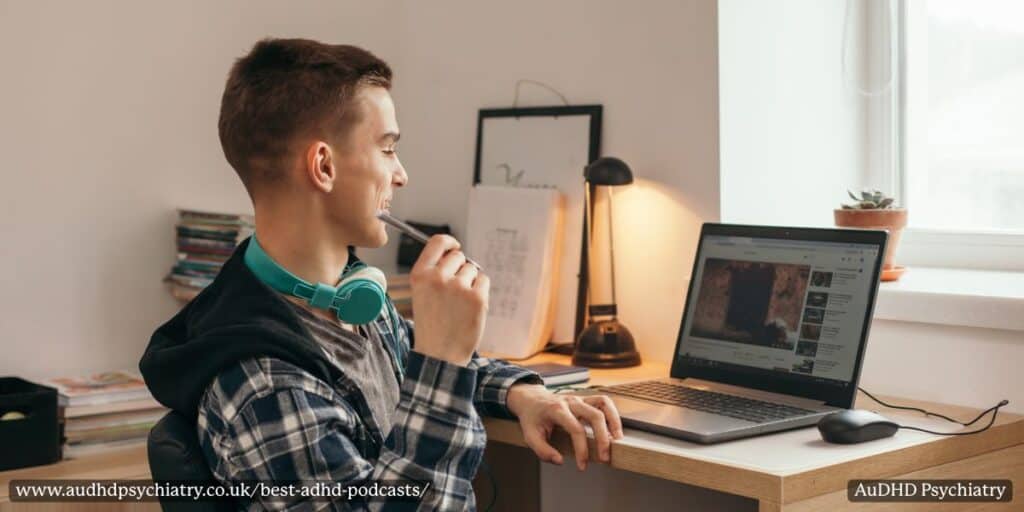
Balance Expert Advice and Lived Experience
Many ADHD podcasts are hosted by certified coaches, clinicians, or mental health professionals, while others are led by individuals sharing their personal experiences. Both perspectives are valuable. Expert-led shows provide practical, evidence-based strategies, while lived-experience channels highlight real-world applications and the ups and downs of ADHD life. The most effective approach often involves listening to a mix of both.
Consider Format and Accessibility
Some people prefer long-form discussions, while others do better with shorter, actionable episodes. Think about your own focus patterns. If attention drifts quickly, a show that delivers concise, step-by-step strategies may be more effective than hour-long interviews. Accessibility also matters. Transcripts, captions, or visual formats can make the content easier to engage with.
By considering your goals, preferred formats, and the balance of expertise versus lived perspective, you can identify the podcasts and channels that provide lasting value.
ADHD Podcast & Channel Categories to Explore
Podcasts and YouTube channels cover a vast range of ADHD-related topics. Having trouble choosing one? Understanding the following categories might help you find the shows that match your needs and interests.
Productivity and Time Management
Many ADHD creators focus on practical strategies for building routines, reducing procrastination, and supporting executive functioning. These podcasts and channels provide tools such as planning methods, reminder systems, and motivational techniques. They are especially useful for people struggling with daily organisation or task initiation.
Burnout, Lifestyle, and Emotional Health
Another common category addresses the broader impact of ADHD on well-being. Topics include ADHD burnout, rejection-sensitive dysphoria, and emotional regulation. Creators in this space often highlight lifestyle adjustments – from sleep hygiene to self-care practices – that help manage ADHD challenges while building resilience.
Parenting and ADHD Diagnoses
Parents and carers often look for resources tailored to supporting children and young people with ADHD. Channels in this category focus on recognising ADHD symptoms early, navigating school systems, and managing daily routines at home. They also provide guidance for parents undergoing their own ADHD diagnoses while raising children.
Diversity and Representation
Representation matters. A growing number of creators highlight the experiences of BIPOC individuals, neurodivergent women, and LGBTQ+ communities. These podcasts and channels amplify stories that are often overlooked, ensuring that ADHD discussions are inclusive and reflective of diverse lived experiences.
By exploring different categories, you can curate a balanced mix of content that offers both practical strategies and broader perspectives on ADHD.
How to Get the Most Value from ADHD Podcasts and Channels
ADHD podcasts and channels can be powerful learning tools, but their impact depends on how you use them. By approaching content intentionally, you can turn listening into meaningful support for your daily life.
Apply One Actionable Tip at a Time
With so many strategies available, it’s easy to feel overwhelmed. Instead of trying to change everything at once, focus on one practical idea from each episode. Whether it’s a new planning method, a reminder app, or a self-care habit, implementing one change at a time increases the chances of lasting improvement.
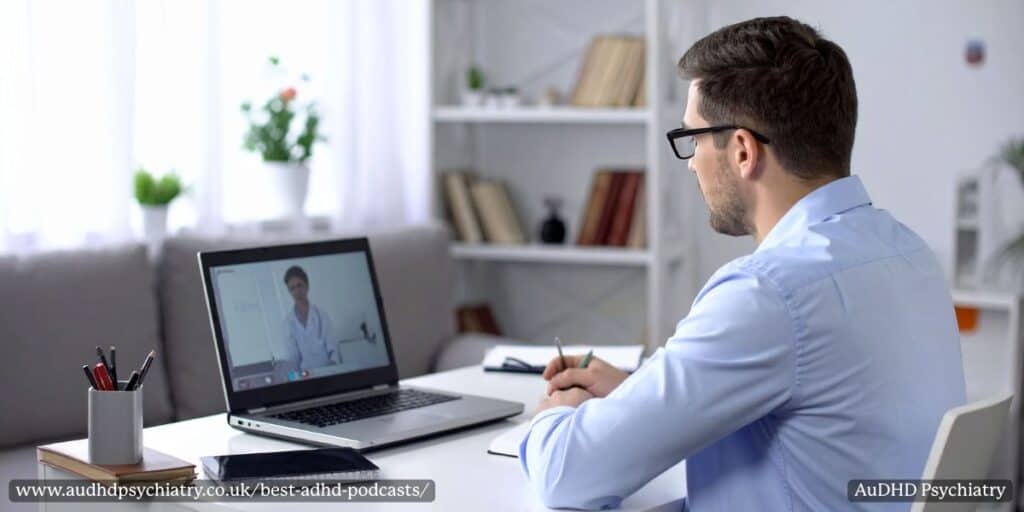
Combine With Professional Support
Podcasts can guide you, but they are not a substitute for professional advice. Consider integrating what you learn with coaching, therapy, or ADHD medication if recommended by a clinician. This layered approach ensures that tips from podcasts complement evidence-based care rather than replace it.
Use Podcasts for Symptom Management
Many ADHD podcasts share techniques for reducing procrastination, improving focus, and building healthy habits. These strategies work best when adapted to your unique ADHD brain. Keep notes on what resonates most, and revisit episodes when you need reinforcement.
Keep Personal Goals in Mind
It helps to listen with specific goals, such as improving executive functioning, managing stress, or boosting productivity. Aligning podcast advice with your priorities makes it easier to filter what’s useful and avoid information overload. By doing so, you can transform passive listening into active learning that supports long-term growth.
Limitations of ADHD Podcasts and Channels
Podcasts and YouTube channels can be excellent sources of ideas and encouragement, but they are not a substitute for professional care. Understanding these limitations ensures you use them effectively.
Not a Replacement for Diagnosis or Treatment
While ADHD podcasts often feature expert interviews and personal experiences, they cannot provide a formal ADHD diagnosis. They also cannot offer medical treatment or adjust approaches to your specific needs. Advice shared in episodes may be helpful for many people, but it is general by nature and not a substitute for personalised clinical guidance.
Risk of Incomplete or Misapplied Information
Podcasts may not cover all ADHD challenges or co-occurring mental health conditions. Without a professional context, strategies can be misunderstood or applied in ways that do not fully address your situation. This makes it important to treat podcasts as supportive resources rather than definitive solutions.
When to Seek Professional Support
If you find yourself recognising your own patterns in podcast discussions or wondering whether ADHD may be affecting your life, the next step is a professional evaluation. A neurodivergent assessment explores your symptoms in depth and leads to a tailored treatment plan, which might include therapy, coaching, or ADHD medication.
Final Thoughts
Listening to the best ADHD podcasts and YouTube channels is a practical way to learn more about ADHD and feel connected to a wider community. These resources provide actionable tips, relatable stories, and expert insights that can support your ADHD journey. They also highlight the diversity of experiences, showing that while challenges are real, there are many strategies and perspectives that can help.
However, podcasts and channels work best when combined with professional care. They are not a replacement for diagnosis or treatment. If you find yourself identifying strongly with the discussions or noticing patterns that resonate with your own life, this may be a signal to take the next step.
At AuDHD Psychiatry, we provide evidence-based ADHD assessments and support tailored to individual needs. Whether you are exploring ADHD for the first time or seeking a second opinion, our clinicians can help you gain clarity and plan the next stage of your care. Book your assessment today and move from listening to taking action.
You Might Also Like
Contact Us
We’re here to answer any questions you might have.
Get in Touch
Opening Hours
Contact Form
We’re here to help. Reach out and we’ll get back to you within 24 hours (Monday – Friday).

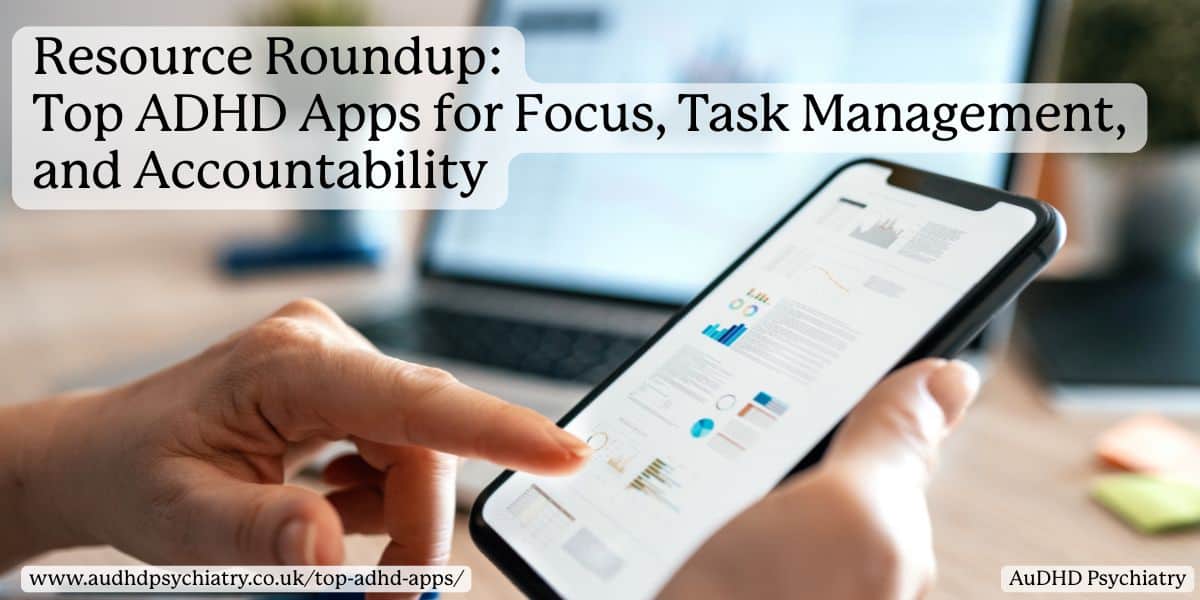
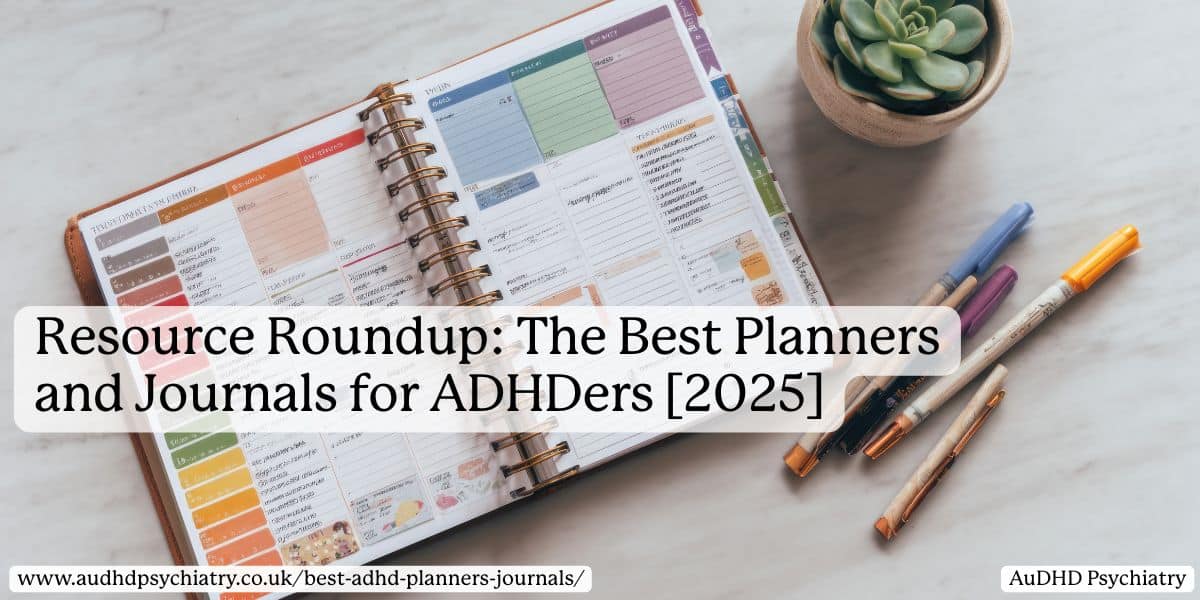
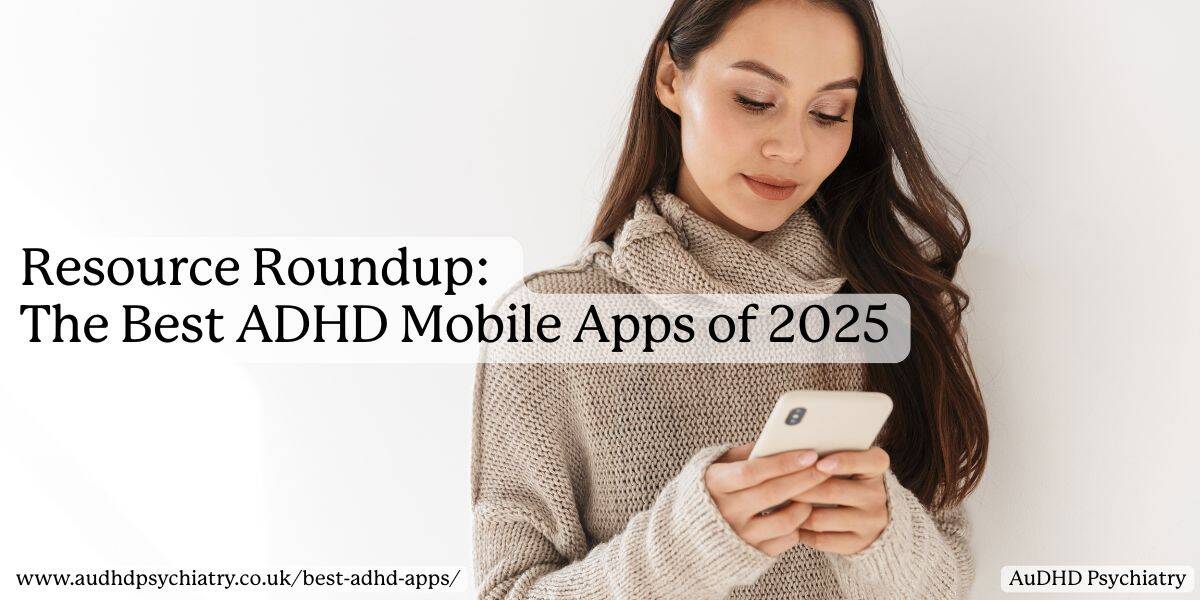
Leave a Reply